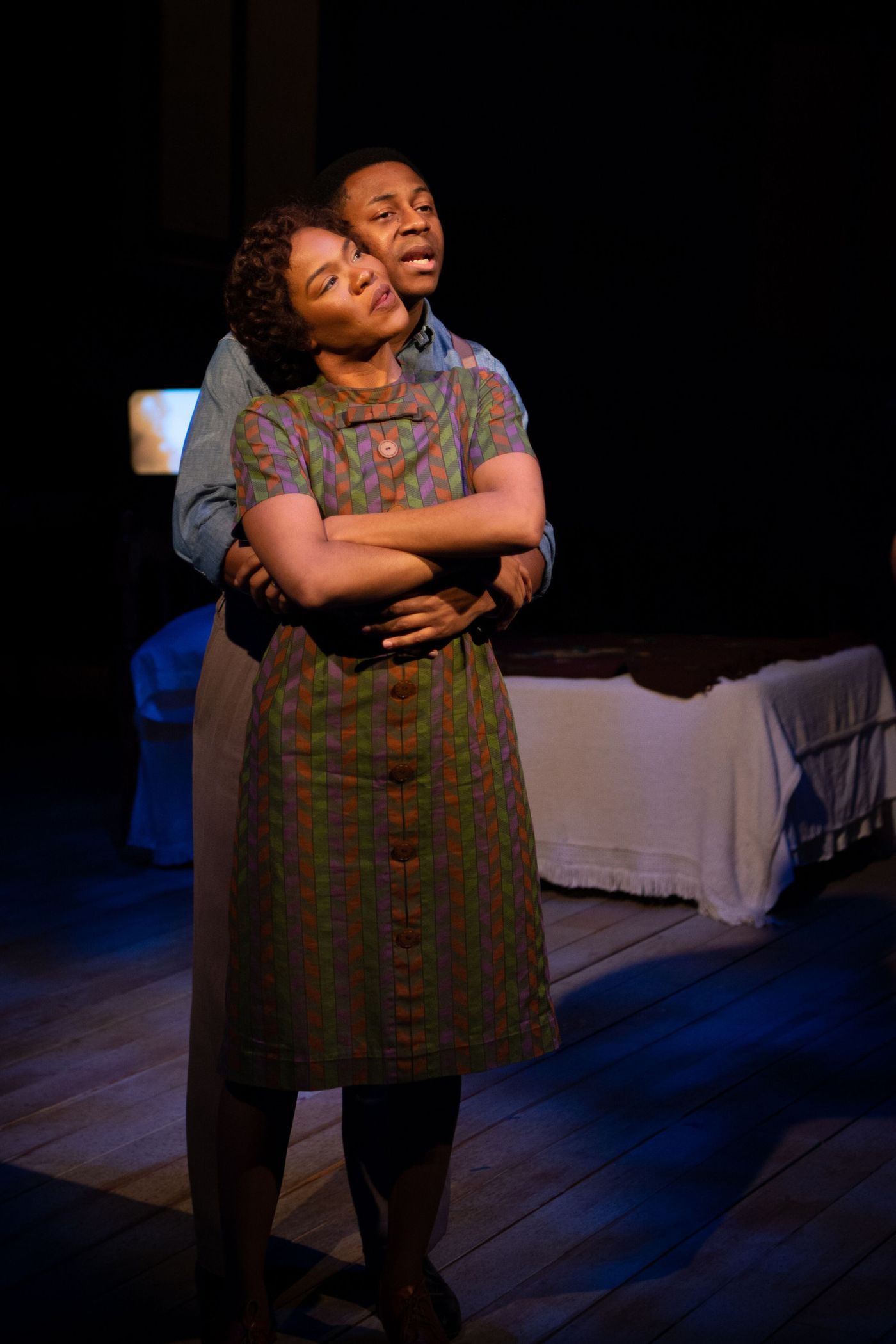Review: World Premiere of BENEVOLENCE at Penumbra Theatre

Ifa Bayeza's (lower case titled) benevolence, the second play in her trilogy revolving around Emmett Till, the 14 year old Chicago boy brutally murdered in the Mississippi Delta in 1955, is hard to watch. It's also important, because it takes us beyond what we think we know to detail the aftermath of Till's violent death on two couples, one white, one black, all real historical figures. Penumbra Theatre in Saint Paul is mounting the world premiere under Talvin Wilks' direction.
What most of us know is that Till's open casket funeral in Chicago became a national event due to widely published graphic photos of his mutilated face. Allowing these was his mother Mamie's way of resisting the silencing expected of so many black victims of trauma. Most historians see her decision as a crucial accelerator in the movement toward civil rights. Penumbra produced the first work in Bayeza's series, THE BALLAD OF EMMETT TILL, in 2014.
This production forces us to confront the texture of daily life in the deep south in 1955. One way it does that is through segregation. That is, Act 1 features the white couple, and Act 2 features the black couple. Aside from very brief moments at the top and the end of the show, the four actors are never on stage together. Each actor plays a variety of roles in order to fill in the story around the central couples. The women are centered in the storytelling.
The white couple are Caroline and Roy Bryant, who owned the small grocery story where Emmett bought two cents of bubble gum from Caroline while her husband, a long distance trucker, was away on the road. Exactly what happened in the store will never be known, and accounts have shifted over the years. Did Till grab Mrs. Bryant's hand? Touch her waist? Wolf whistle? Say something? Whatever he did, when news of it reached Roy Bryant and his half-brother JW Milam, they responded with extreme violence, kidnapping, torturing, and killing Till. They were tried but acquitted by an all-white jury; no one has ever done time for Till's murder.
Till never appears in benevolence. We meet the Bryants, whose relationship is depicted as violent on his part and manipulative on hers well before the incident that would propel them into prominence. These are not likeable people, and actors Sara Marsh and Peter Christian Hansen make no effort to pretty them up, something that requires considerable performative courage. Caroline, a local beauty queen who never graduated high school, is the mother of two small children. She's shown alternately fending off and inviting advances from her brother-in-law. It seems she believes her sexuality is the only thing that gives her any access to power. The play skips forward in time as far as 2005, where we see her in an interview with an FBI agent after the case was reopened but does not mention the controversial 2017 book by Timothy Tyson. (Tyson interviewed Bryant, who by then was divorced and remarried with the surname Donham. Tyson has sealed the interview transcripts until the year 2036.)
Act 2 gives us two far more likeable people: Beulah and Clinton Melton, played by Dame-Jasmine Hughes and Darrick Mosley. They are a loving couple with four little kids who live in the Mississippi Delta, near the site of Till's murder, and their relationship is under threat both by his infidelity and the surrounding pervasive racial terror. Their respective efforts to claim full personhood and agency in the face of these overwhelming challenges are remarkable and heart-breaking, and end in disparate tragedies. One person who steps up to try and assist is Medgar Evers (played by Mosley), who will eventually also be martyred to the cause of civil rights, though that does not figure in this script.
All the action plays out on wooden plank flooring, with a simple table, multiple wooden chairs and a few props that the actors move around as needed. Walls on two sides are printed with legible phrases which don't add up to a coherent text. A major set event at the end of Act 1 is symbolic and effective. Costume changes happen on stage. Sexual scenes and violence make this a rough experience for adults; I can't recommend it for children. Nor can I imagine what it costs the four performers who, show after show, must travel through what director Talvin Wilks calls "a surreal tapestry of violence, longing, love, and loss."
Wilks further describes this production as "A call for collective witnessing, collective contemplation and collective change." I hope the hard work of these artists, which itself is of course easier than the lived experiences of the actual people they are depicting, can work that kind of alchemy in the audience.
Penumbra Theatre is one of the deep repositories of African-American stories in the US and has long been home to theater artists who want to bring into the light what has often been consigned to the shadows. Their commitment to educating all of us--not only people of color, and not only young people--about our shared history, including deep sorrows and divides that are not healed, has been consistent over decades. Check out the archive of study guides related to productions going back and back on their website: these are full of primary documents and revealing interviews with many people, both famous and little known. For benevolence, the study guide runs to 64 pages. It's a gold mine if you want to deepen your understanding of how we have arrived at the racial politics of the present day.
This production runs through March 10 in Saint Paul.
Photo credit: Allen Weeks
Reader Reviews
Videos

